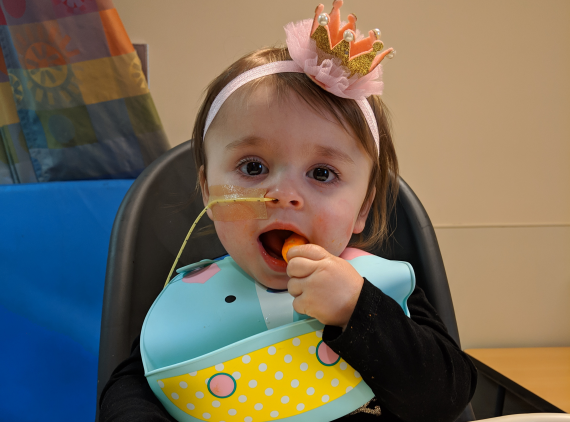Feeding disorders have been found to occur in 40-50% of typically developing children and 80-90% of children with neurodevelopmental disorders. Those with a pediatric feeding disorder can struggle with feeding difficulties that are sometimes persistent and create considerable difficulties including nutritional deficiencies, poor weight gain, growth and family stress.
Pediatric Feeding Disorder (PFD) is defined as impaired oral intake that is not age-appropriate, and is associated with medical, nutritional, feeding skill, and/or psychosocial dysfunction (Goday, 2019).
February 2-8, 2025 is Feeding Tube Awareness Week
It’s the perfect time to learn about our family-centered, interdisciplinary team offering a variety of feeding programs to address and eliminate feeding difficulties of all levels. Phoenix Children’s provides a comprehensive evaluation and treatment for medically complex children with pediatric feeding disorders. Our highly specialized team, with years of experience, is committed to providing the best care for feeding disorders including:
- Swallowing difficulties
- Dysphagia and aspiration
- Enteral tube feeding dependence
- Failure to thrive, poor weight gain, weight loss
- Selective eating and sensory feeding difficulties
- Oral motor skills, lengthy mealtimes, difficulty advancing to new foods
The Feeding Disorders team at Phoenix Children's provides individualized treatment recommendations for each patient and family through a comprehensive approach including a multidisciplinary clinic evaluation by Gastroenterology, Psychology, Registered Dietitian, Speech Pathology, and Occupational Therapy, as well as a lead clinical specialist and program coordinator.
Our team is highly skilled with the use of feeding tubes to help provide the nutrition and hydration that a child is not able to sustain orally. This provides a bridge that allows a child to learn the skills needed to eat and drink by mouth while receiving the critical nutrition and hydration provided by the feeding tube.
Types of feeding tubes include:
- NG-tubes: NG-tubes enter the body through the nose and run down the esophagus into the stomach.
- ND- or NJ-tubes: ND-tubes are similar to NG-tubes, but they go through the stomach and end in the first portion of the small intestine (duodenum). NJ-tubes extend even further to the second portion of the small intestine (jejunum). Bypassing the stomach can be beneficial for those whose stomachs do not empty well, who have chronic vomiting, or who inhale or aspirate stomach contents into the lungs.
- Gastrostomy tubes (G-tube): G-tubes are the most common type of feeding tubes. G-tubes are placed through the abdominal wall into the stomach.
- PEG and Long tubes: These are one-piece tubes held in place either by a retention balloon or by a bumper.
- Gastrojejunal tubes (GJ-tube): GJ-tubes are placed in the stomach just like G-tubes, but a thin, long tube is threaded into the jejunal (J) portion of the small intestine. The vast majority of children who get GJ feeding tubes begin with G-tubes; it is rare for a GJ-tube to be placed initially. Most often, the J-port is used for feeding and the G-port is used for venting and sometimes for medications.
- Gastric tube considerations: G-tubes can be more comfortable than nasal tubes and are a safer option for longer-term tube feeding. There are low profile, button-style G-tubes that are not as noticeable under clothing. A trained parent or caregiver can replace the balloon button G-tubes at home.
Patients seen in clinic are referred for outpatient intensive feeding therapy (IFT) at Phoenix Children’s, regarded as the place of choice for treatment of severe feeding disorders. The primary goals include reducing or eliminating the need for liquid or enteral tube feeding, successful oral feeding while minimizing the risk of pulmonary complications and maximizing the quality of life.
Intensive Feeding Therapy includes three phases of outpatient treatment:
- Intensive Phase (5-6 weeks): 24 visits - including four therapy visits per week with an Occupational Therapist (OT) and Feeding therapist, as well as three to five Gastroenterology (GI) and Registered Dietician (RD) appointments.
- Transition Phase (4-6 weeks): one Feeding and one OT visit per weeks and a two-month follow-up with GI and RD appointment.
- Maintenance phase (6 months): reduced therapies based on individual patient needs and six-month follow-up with GI and RD appointment.
We have three locations to help your kids with all their needs:
Our Thomas Campus team is led by Dana I. Williams, MD, Medical Director, Aerodigestive and Feeding and Swallowing Program, Department of Pediatric Gastroenterology and Nutrition.
Our East Valley team is led by Soofia Khan, MD, Aerodigestive and Feeding and Swallowing Program, Department of Pediatric Gastroenterology and Nutrition.
Our Avondale team is led by Amanda Pope, MD, Department of Pediatric Gastroenterology and Nutrition.

